

How much is the sea worth? - BBC News. If the world's seas and oceans were a national economy, how much would they be worth?
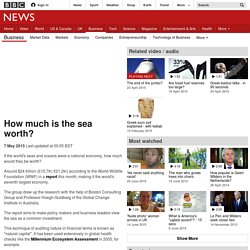
Around $24 trillion (£15.7tn; €21.2tn) according to the World Wildlife Foundation (WWF) in a report this month, making it the world's seventh largest economy. The group drew up the research with the help of Boston Consulting Group and Professor Hoegh-Guldberg of the Global Change Institute in Australia. The report aims to make policy makers and business leaders view the sea as a common investment. This technique of auditing nature in financial terms is known as "natural capital". China’s Amazonian railway ‘threatens uncontacted tribes’ and the rainforest. Chinese premier Li Keqiang is to push controversial plans for a railway through the Amazon rainforest during a visit to South America next week, despite concerns about the possible impact on the environment and on indigenous tribes.
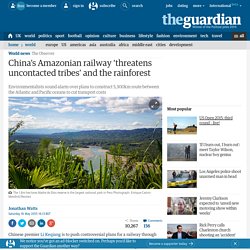
Currently just a line on a map, the proposed 5,300km route in Brazil and Peru would reduce the transport costs for oil, iron ore, soya beans and other commodities, but cut through some of the world’s most biodiverse forest. Invasion of the goldfish: ecosystem in danger as Colorado lake taken over. Next time you think of dumping your goldfish rather than cleaning out the bowl – again – think twice.
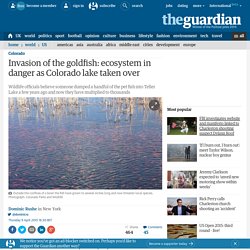
Fish sticks and Aqua Bob Squarepants could threaten the stability of an entire ecosystem. Goldfish have taken over a lake in Bolder, Colorado, and their spread is threatening to wipe out local species. Park officials are now weighing plans to rid Teller Lake of the brightly coloured pests before they spread into the state’s wider water ways. Wildlife officials believe someone dumped a handful of the pet fish into Teller Lake a few years ago. Demand for rubber 'threatens forests' - BBC News. The global demand for rubber tyres is threatening protected forests in Southeast Asia, according to a study.
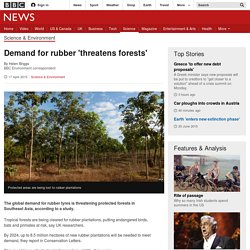
Tropical forests are being cleared for rubber plantations, putting endangered birds, bats and primates at risk, say UK researchers. Oceans are world's seventh largest economy worth $24tn, says WWF report. A day in the life of baby coral. Most of the Caribbean’s coral reefs are in bad shape, victims of overfishing, sewage and fertilizer pollution, disease, rising temperatures, and reckless coastal development.
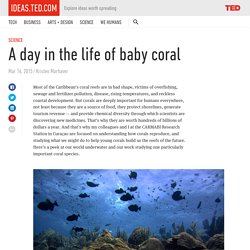
But corals are deeply important for humans everywhere, not least because they are a source of food, they protect shorelines, generate tourism revenue — and provide chemical diversity through which scientists are discovering new medicines. That’s why they are worth hundreds of billions of dollars a year. And that’s why my colleagues and I at the CARMABI Research Station in Curaçao are focused on understanding how corals reproduce, and studying what we might do to help young corals build us the reefs of the future. Here’s a peek at our world underwater and our work studying one particularly important coral species. Meet the coral reef of Curaçao Here’s the reef in Curaçao.
How we make homemade coral nurseries. Earth - The story of rhinos and how they conquered the world. Let's go back in time 30 million years, long before modern humans appeared.
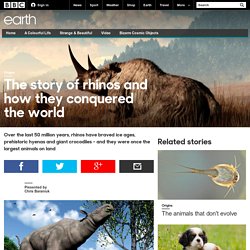
Climate change risk to 'one in six species' - BBC News. One in six species on the planet could face extinction if nothing is done to tackle climate change, analysis suggests.
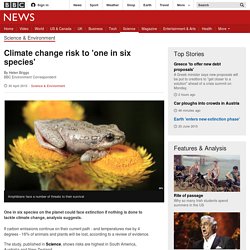
If carbon emissions continue on their current path - and temperatures rise by 4 degrees - 16% of animals and plants will be lost, according to a review of evidence. The study, published in Science, shows risks are highest in South America, Australia and New Zealand. Previous estimates range from 0 to 54%. Dr Mark Urban of the University of Connecticut, US, analysed data from 131 scientific studies on the risk of extinction from climate change. He found that the rate of biodiversity loss is likely to speed up with each degree Celsius rise in temperature.
If future temperatures rise by 2 degrees compared with pre-industrial times, global extinction risk will rise from 2.8% today to 5.2%. But under the scenario where global warming continues on its current path, 16% of species (one in six) face extinction. Explicit cookie consent. If the oceans were a country… The theme for this year’s World Environment Day is Seven Billion Dreams.
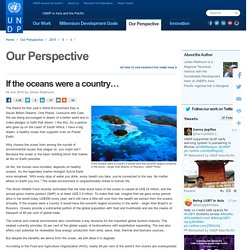
One Planet. Consume with Care. We are being encouraged to dream of a better world and to make pledges to fulfill that dream. I like this. As a person who grew up on the coast of South Africa, I have a big dream: a healthy ocean that supports lives on Planet Earth. Why choose the ocean from among the myriad of environmental issues that plague us, you might ask?
Why is biodiversity so important? - Kim Preshoff. Rising seas, sinking peat to swamp Malaysian and Indonesian palm oil. Forest set alight to clear land for oil palm in Riau's peatlands June 3, 2015.
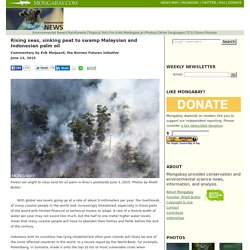
Photos by Rhett Butler. With global sea levels going up at a rate of about 9 millimeters per year, the livelihoods of many coastal people in the world look increasingly threatened, especially in those parts of the world with limited financial or technical means to adapt.